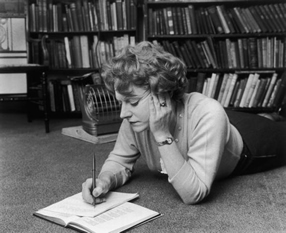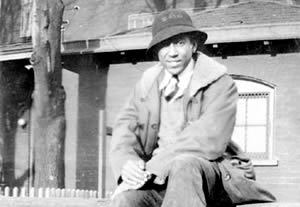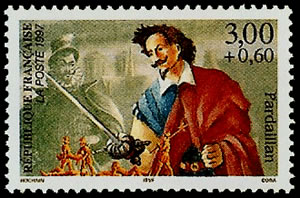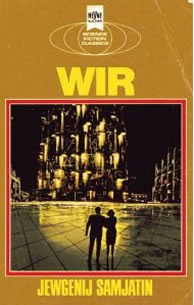De Schotse schrijfster Muriel Spark werd op 1 februari 1918 geboren als Muriel Sarah Camberg in Edinburgh. Zie ook alle tags voor Muriel Spark op dit blog.
Uit: Muriel Spark: The Biography (Biografie door Martin Stannard)
„Muriel Sarah Camberg arrived in the middle of the night (3 a.m., 1 February 1918) and immediately became her parents’ princess. Later in life, she would occasionally amuse herself with the fantasy that she was a real princess, kidnapped by gypsies (her parents). She saw her life as a Cinderella story – and Rossini’s La Cenerentola was not one of her favourite operas for nothing. How she had emerged from that family intrigued her. She was born in a small rented flat at 160 Bruntsfield Place, in the Morningside district of Edinburgh. Her brother, Philip, had made his appearance in the middle of the day five and a half years earlier, in another flat, down the hill and round the corner at 55 Viewforth. He welcomed his new sister guardedly. As they grew up together this emotional distance increased. And they remained night and day to each other for the rest of their lives, uncomplementary (and sometimes uncomplimentary) opposites. ‘My brother’, she remarked to me, ‘is like a Chekhov short story. When you meet him you’ll know what I mean.’During April 1962, with the great success of The Prime of Miss Jean Brodie behind her and life as a celebrity ahead, she began to reflect on all this. She was back in Edinburgh, attending her father’s deathbed in the Royal Infirmary. What was she doing in the elegant North British Hotel when her mother, brother and son were gathered in the family home? By hitching her legs up on to the window-sill of her room she could prop herself on one side or the other. The broad sash was lifted, opening, to the left, on the craggy outcrop of Arthur’s Seat, to the right on Princes Street Gardens, just coming into bloom in cold spring sunshine.
Above everything loured the castle, erupting between the Old Town and the New. This brutal caesura, dividing the tangle of ancient closes from the rational elegance of eighteenth-century town planning, seemed to her somehow symbolic. There was a link, as yet still an abstraction, between the topography of Edinburgh and the topography of her mind. Most people in her circumstances would have been saturated in melancholy. But Muriel was not like most people. Her response to the world was rarely one of self-pity. She was an artist, a channel through which impressions could flow, a cold medium.“

Muriel Spark (1 februari 1918 – 13 april 2006)
De Amerikaanse schrijver Langston Hughes werd geboren op 1 februari 1902 in Joplin, Missouri. Zie ook alle tags voor Langston Hughes op dit blog.
Acceptance
God in His infinite wisdom
Did not make me very wise-
So when my actions are stupid
They hardly take God by surprise
Children’s Rhymes
By what sends
the white kids
I ain’t sent:
I know I can’t
be President.
What don’t bug
them white kids
sure bugs me:
We know everybody
ain’t free.
Lies written down
for white folks
ain’t for us a-tall:
Liberty And Justice–
Huh!–For All?

Langston Hughes (1 februari 1902 – 22 mei 1967)
De Franse schrijver, journalist en anarchistisch activist Michel Zevaco werd geboren op 1 februari 1860 in AjaccioZie ook alle tags voor Michel Zevaco op dit blog.
Uit: Les Pardaillan
“Lorsque Pardaillan frappa contre le mur les trois coups convenus, le nain s’empressa d’ouvrir et accueillit le chevalier triomphant avec des manifestations d’une joie aussi bruyante que sincère, qui l’émurent doucement.
—J’ai bien cru que vous ne sortiriez pas vivant de là-dedans, dit-il, quand il se fut un peu calmé.
—Bah! répondit Pardaillan en souriant, j’ai la peau trop dure, on ne m’atteint pas aisément.
—J’espère que nous allons nous en aller, maintenant? fit le Chico qui tremblait à la pensée que le Français ne s’avisât de s’exposer encore, bien inutilement, à son sens.
A sa grande satisfaction, Pardaillan dit:
—Ma foi, oui! Ce séjour est peut-être agréable pour des bêtes de nuit, mais il n’a rien d’attrayant et il est trop peu hospitalier pour d’honnêtes gens comme Chico. Allons-nous-en donc!
Le soleil se levait radieux, lorsque Pardaillan, accompagné de Chico, fit son entrée dans l’auberge de la Tour.
Dans la vaste cheminée de la cuisine, un feu clair pétillait, et la gouvernante Barbara, pour ne pas en perdre l’habitude, maugréait et bougonnait contre les jeunes maîtresses qui ne veulent en faire qu’à leur tête, et qui, après avoir passé la plus grande partie de la nuit debout, sont levées les premières et parées de leurs plus beaux atours, gênent les serviteurs honnêtes et consciencieux acharnés à leur besogne.“

Michel Zevaco (1 februari 1860 – 8 augustus 1918)
Les Pardaillan op een Franse postzegel
De Russische revolutionair en schrijver Jevgeni Zamjatin werd geboren op 1 februari 1884 in Lebedyan. Zie ook alle tags voor Jevgeni Zamjatin op dit blog.
Uit: Wir (Vertaald door Gisela Drohla)
„Frühling. Aus der wilden, unbekannten Weite jenseits der Grünen Mauer weht der Wind gelben Blütenstaub herüber. Dieser süßliche Staub macht die Lippen trocken — man muss sie alle Augenblicke mit der Zunge anfeuchten —, alle Frauen, die mir begegnen, haben diese süßen Lippen (die Männer natürlich auch). Das verwirrt das logische Denken ein wenig.
Doch was für ein Himmel! Tiefblau, von keiner einzigen Wolke befleckt (was für einen jämmerlichen Geschmack müssen unsere Vorfahren gehabt haben, wenn diese dummen, unförmigen Dampfklumpen ihre Dichter begeistern konnten). Ich liebe einen sterilen, peinlich sauberen Himmel. Nicht ich allein, wir alle, ich täusche mich nicht, lieben ihn. An einem Tag wie heute ist die ganze Welt aus dem unzerbrechlichen ewigen Glas gegossen, aus dem die Grüne Mauer und alle unsere Gebäude bestehen. An solchen Tagen sieht man die blauste Tiefe dieser Dinge, nimmt unbekannte Größen, wunderbare Gleichungen wahr — man entdeckt sie im Allergewöhnlichsten, Alltäglichsten…
Heute morgen zum Beispiel war ich auf der Werft, wo der Integral gebaut wird. Plötzlich fiel mein Blick auf die Maschinen. Mit geschlossenen Augen, selbstvergessen, drehten sich die Kugeln der Regulatoren. Die blitzenden Hebel neigten sich nach rechts und nach links, stolz wiegte sich die Balancierstange in den Schultern, der Meißel der Stemmmaschine knirschte im Takt einer unhörbaren Musik. Da ging mir die Schönheit dieses prächtigen, von bläulichem Sonnenlicht überfluteten Maschinenballetts auf.
Unwillkürlich fragte ich mich dann: Warum ist das schön? Warum ist der Tanz schön? Die Antwort: Weil er eine unfreie, eine gebundene Bewegung ist, weil sein tieferer Sinn die vollkommene ästhetische Unterwerfung, die ideale Unfreiheit ist. Wenn es stimmt, dass unsere Ahnen in Augenblicken der höchsten Begeisterung sich dem Tanz hingaben (religiöse Mysterien, Militärparaden), dann kann das nur das eine bedeuten: der Trieb zur Unfreiheit ist dem Menschen angeboren, und wir in unserem heutigen Leben tun nur bewusst…“

Jevgeni Zamjatin (1 februari 1884 – 10 maart 1937)
Duitse Cover
Zie voor nog meer schrijvers van de 1e februari ook mijn blog van 1 februari 2011 deel 2.
